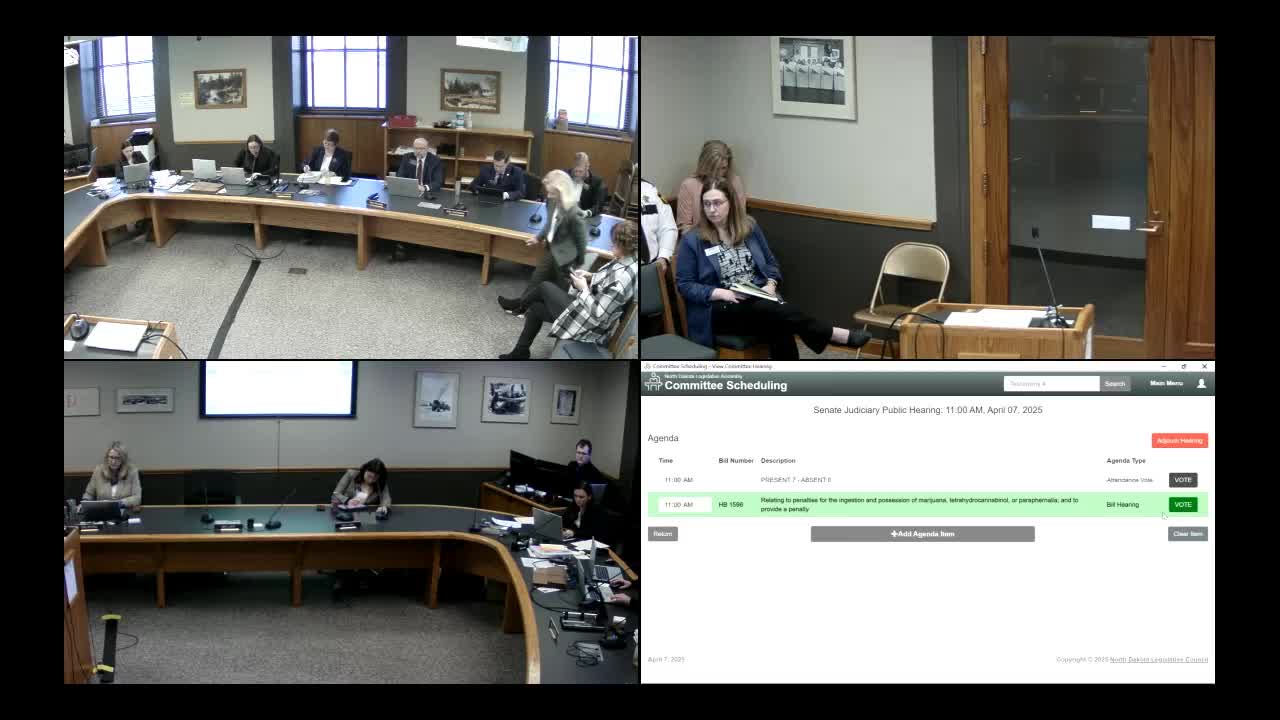Judiciary committee votes 'do not pass' on bill to convert low‑level marijuana possession to citation
Get AI-powered insights, summaries, and transcripts
Subscribe
Summary
After hearing testimony from public defenders, prosecutors and law‑enforcement groups, the North Dakota Judiciary Committee recommended a do‑not‑pass on House Bill 1596, which would have converted small‑amount marijuana and paraphernalia offenses into noncriminal citations and kept juvenile cases in juvenile court.
The Judiciary Committee voted to recommend a “do not pass” on House Bill 1596, a bill that would convert certain low‑level marijuana and paraphernalia offenses into noncriminal citations rather than criminal charges. The committee vote was 5 in favor of a do‑not‑pass recommendation and 2 opposed; the motion was moved by Senator José Castaneda and seconded by Senator Lueck.
Sponsors and supporters said HB1596 is intended to reduce workload for prosecutors, defenders and courts without eliminating a monetary deterrent. Representative Liz Conmey, sponsor and District 11 lawmaker from Fargo, told the committee the bill responds to suggestions from county state’s attorneys and law‑enforcement agencies aimed at easing congestion in courtrooms and prosecutorial offices. “HB 1596 makes the least of these marijuana offenses a non criminal citation,” Conmey said, adding that the measure keeps the same fine while reducing required court appearances.
Conmey summarized state data she said informed the bill: between Jan. 1, 2021, and Dec. 31, 2024, North Dakota recorded 8,676 marijuana charges, 7,365 cases opened and roughly 17,000 hearings; 2,357 cases had public defenders appointed. She told the committee that in 2024 “over 90% of the cases involved the least of the charges.” The bill’s text, as described to the committee, would make possession under specified small weights a noncriminal citation with a $150 fine, while larger weights would remain misdemeanors with larger fines and possible jail time.
Travis Fink of the North Dakota Commission on Legal Counsel for Indigence (testifying on behalf of indigent defense interests) said indigent defense workloads drive support for the change. “We have approximately 17,000 some case assignments a year,” Fink told the committee, and making low‑level possession a citation would let defenders concentrate resources on cases where liberty is at risk. Fink also proposed an amendment discussed for the committee’s consideration: keep persons under 21 treated as juveniles (an infraction handled in juvenile court) while making possession by persons 21 and older a noncriminal citation.
Law‑enforcement and prosecutor groups urged the committee to reject the bill. Stephanie Ingebretson, representing the Chiefs of Police Association of North Dakota, said the chiefs oppose converting a current criminal offense into a citation. “The Chiefs of Police position is really concerned about taking something that is illegal, is a criminal offense now … and basically turning it into a traffic ticket,” she said, adding the association views the change as a move toward legalization that voters have rejected.
Captain Jason Craft of the Ward County Sheriff’s Office said his agency opposed the bill, arguing it would make possession of a Schedule I controlled substance a lesser penalty than possession of alcohol for underage persons. Using a hypothetical of two 20‑year‑olds stopped together, he said the person cited for underage alcohol possession would have a criminal infraction on record while the person with small‑amount marijuana would receive only a $150 citation. Craft also described existing local practices that, he said, already allow efficient resolution of many low‑level possession matters through predrafted plea paperwork in his jurisdiction.
Danelle Presky, executive director of the North Dakota Sheriffs and Deputies Association (appearing also for the North Dakota Association of Counties), asked the committee for a do‑not‑pass recommendation and said the proposed change would signal decriminalization despite recent ballot measures rejecting legalization.
Committee members discussed balancing court and defender workloads against public sentiment and law‑enforcement concerns. Senator Brownberger spoke against the do‑not‑pass motion, arguing “alcohol is far more dangerous than marijuana” and supporting the change to reduce burdens for small cases. Senator Paulson said the Ward County state’s attorney’s local approach to plea paperwork might be a model to standardize statewide.
The committee then voted on a do‑not‑pass recommendation for HB1596. The roll call recorded Senator Paulson — Aye; Senator Myrtle — Aye; Senator Lueck — Yes; Senator Cory — No; Senator Castaneda — Aye; Senator Brownberger — No; Chair Larson — Yes. Chair Larson announced the motion carried. Senator Bridal indicated a willingness to carry the bill to the next step.
The committee closed the hearing and moved on to other bills on its agenda; members scheduled the next meeting for 9 a.m. the following day.
